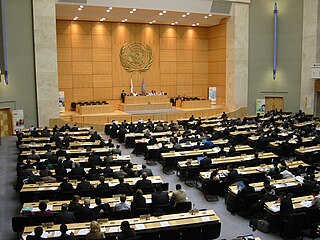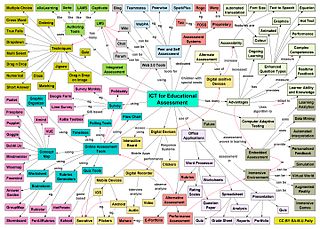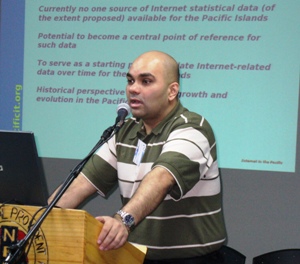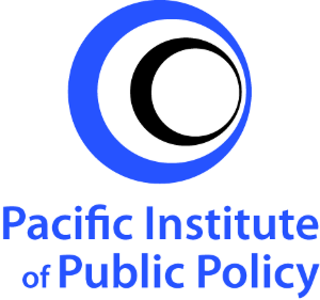Related Research Articles

The National Telecommunications and Information Administration (NTIA) is an agency of the United States Department of Commerce that serves as the President's principal adviser on telecommunications policies pertaining to the United States' economic and technological advancement and to regulation of the telecommunications industry.

The World Summit on the Information Society (WSIS) was a two-phase United Nations-sponsored summit on information, communication and, in broad terms, the information society that took place in 2003 in Geneva and in 2005 in Tunis. WSIS Forums have taken place periodically since then. One of the Summit's chief aims is to bridge the global digital divide separating rich countries from poor countries by increasing internet accessibility in the developing world. The conferences established 17 May as World Information Society Day.

The Pacific Islands Forum (PIF) is an inter-governmental organization that aims to enhance cooperation between countries and territories of Oceania, including formation of a trade bloc and regional peacekeeping operations. It was founded in 1971 as the South Pacific Forum (SPF), and changed its name in 1999 to "Pacific Islands Forum", so as to be more inclusive of the Forum's Oceania-spanning membership of both north and south Pacific island countries, including Australia. It is a United Nations General Assembly observer.
The Association for Progressive Communications (APC) is an international network of organizations that was founded in 1990 to provide communication infrastructure, including Internet-based applications, to groups and individuals who work for peace, human rights, protection of the environment, and sustainability. Pioneering the use of ICTs for civil society, especially in developing countries, APC were often the first providers of Internet in their member countries.
The Pacific Islands Chapter of the Internet Society (PICISOC) serves the Internet Society’s purposes by serving the interests of the global Internet community through its presence in the Pacific Islands. In addition to ISOC interests, PICISOC also focuses on local issues and developments and acts as an impartial advisor to governments and the public on matters of significant interest to Pacific Island people concerning the Internet and ICT technology in general.

Information and communications technology (ICT) is an extensional term for information technology (IT) that stresses the role of unified communications and the integration of telecommunications and computers, as well as necessary enterprise software, middleware, storage and audiovisual, that enable users to access, store, transmit, understand and manipulate information.
The Council of Regional Organisations in the Pacific (CROP) is an inter-organisational consultative process which aims to prevent either overlaps, or gaps, appearing between the work-programmes of its various members.

The Technical Centre for Agricultural and Rural Cooperation ACP-EU (CTA) was established in 1983 under the Lomé Convention between the African, Caribbean and Pacific Group of States and EU member states. Since 2000 CTA has operated within the framework of the ACP-EU Cotonou Agreement with a mission to “strengthen policy and institutional capacity development and information and communication management capacities of ACP agricultural and rural development organisations. It assists such organisations in formulating and implementing policies and programmes to reduce poverty, promote sustainable food security, preserve the natural resource base and thus contribute to building self-reliance in ACP rural and agricultural development.”. The centre is closed in 2020, after the end of the Cotonou Agreement and the subsequent end of its financing.
Electronic participation (e-participation) is ICT-supported participation in processes involving government and citizens. Processes may concern administration, service delivery, decision making and policy making. E-participation is hence closely related to e-government and e-governance participation. The need for the term has emerged as citizen interests and interaction with political service providers have increasingly become digitized due to the rise of e-government.
Asia-Pacific Development Information Programme was an initiative of UNDP and "aims to promote the development and application of information and communication technologies for sustainable human development". Its sphere of work was the Asia-Pacific region. APDIP was based within the UN premises in Kuala Lumpur, Malaysia.
In 2003 and following years, initiatives were instituted to improve internet access for people with disabilities in the Philippines. These measures were inspired by the UNESCAP "Asia-Pacific Decade for Disabled Persons" (1993–2002). Key organizations included the government body National Council for the Welfare of Disabled Persons (Philippines) and the private sector body Philippine Web Accessibility Group (PWAG). The "Disabled Friendly Website Awards" were launched to encourage web designers to incorporate universal access. Since 2009 unhampered access to Information and Communications Technology (ICT) has been in the second National Human Rights Action Plan of the Philippine government.
The Pacific INET, or PacINET, conference is organised by the Pacific Islands Chapter of the Internet Society, (PICISOC) and is the leading Information and Communications Technology conference in the Pacific Islands.

Rajnesh Dhirendra Singh is a Fijian entrepreneur and engineer. He holds several positions in the regional and international Information and Communications Technology community including the Internet Society and IPv6 Forum, and is an active Internet advocate and speaker on Internet technologies.
Information and communication technology in agriculture, also known as e-agriculture, focuses on the enhancement of agricultural and rural development through improved information and communication processes. More specifically, e-agriculture involves the conceptualization, design, development, evaluation and application of innovative ways to use information and communication technologies (ICTs) in the rural domain, with a primary focus on agriculture. ICT includes devices, networks, mobiles, services and applications; these range from innovative Internet-era technologies and sensors to other pre-existing aids such as fixed telephones, televisions, radios and satellites. Provisions of standards, norms, methodologies, and tools as well as development of individual and institutional capacities, and policy support are all key components of e-agriculture.

K M Baharul Islam is presently the Chairperson of Centre of Excellence in Public Policy and Government at Indian Institute of Management Kashipur. He served as the Dean (Academics) during 2019-2021 at the same institute. He was elected as a Fellow of the Royal Asiatic Society of Great Britain and Ireland on 18 March 2020. In October 2021, he was invited as a Visiting Professor at the London School of Economics.
Design for All in the context of information and communications technology (ICT) is the conscious and systematic effort to proactively apply principles, methods and tools to promote universal design in computer-related technologies, including Internet-based technologies, thus avoiding the need for a posteriori adaptations, or specialised design.
Nalaka Gunawardene trained as a science writer, he has worked as a journalist, broadcaster and development communicator since 1987.
Information technology in Pakistan is a growing industry that has the potential to expand more in the future. Matters relating to the IT industry are overseen by the Ministry of Information Technology of the Government of Pakistan. The IT industry is regarded as a successful sector of Pakistan economically, even during financial crisis. The first IT policy and implementation strategy was approved under the leadership of Atta-ur-Rahman, the Federal Minister of Science and Technology in August 2000 which laid the foundations of the development of this sector. The emphasis was placed on quality IT education in universities rather than numbers during this period. The quality measures introduced by Atta-ur-Rahman as Chairman of Higher Education Commission during 2002-2008 included:1) All PhD thesis were evaluated by eminent foreign scientists,2) All PhD thesis and research papers were checked for plagiarism 3) Some 11,000 students were sent abroad to leading universities for PhD level training and absorbed on their return, 4) Appointments at faculty positions were linked to international stature of the applicants as judged from their international publications, patents and citations, and (5) Quality Enhancement Cells were established in all universities for the first time in the history of the country. Thereafter two policies were launched by the Ministry of IT under the leadership of Anusha Rahman Khan, Federal Minister for IT and Telecom (2013-2018). The Telecom Policy was announced in December 2015, and later National Digital Pakistan Policy that was approved by the cabinet in May 2018. In 2001, a 15 year tax holiday was approved to promote the IT industry which has the grown from $30 million to over $3 billion during the last 16 years. A nationwide programme to train teachers was initiated by Intel in March 2002 in Pakistan on the request of Atta-ur-Rahman which has resulted in the training of 220,000 teachers across 70 districts at no cost to the government. The government of Pakistan has given incentives to IT investors in the country during the last decade, this resulted in the development of the IT sector. From 2003 to 2005, the country's IT exports saw a rise of about fifty percent and amounted a total of about 48.5 million USD. The World Economic Forum, assessing the development of Information and Communication Technology in the country ranked Pakistan 111th among 144 countries in the Global Information Technology report of 2014. In an analysis of scientific research productivity of Pakistan, in comparison to Brazil, Russia, India and China, Thomson Reuters has applauded the developments that have taken place as a result of the reforms introduced by Atta-ur-Rahman, since Pakistan has emerged as the country with the highest increase in the percentage of highly cited papers in comparison to the "BRIC" countries. Atta-ur-Rahman is Co-Chairman of the Prime Ministers Task Force on Information Technology and Telecommunications. As a result of the measures introduced on the recommendation of the Task Force, there has been a sharp increase in software exports of Pakistan.

The Pacific Institute of Public Policy (PiPP) is an independent, non-profit, regionally focused think tank based in Port Vila, Vanuatu. The stated aim of PiPP is to stimulate and support informed policy debate in the Pacific. A central feature of PiPP's model of engagement with policy stakeholders is the distribution of research via several media including: research syntheses, discussion papers, forums, public debates, social networking, audio and video podcasts, press, radio and television. PiPP was established on November 21, 2007 under the Vanuatu Charitable Associations (Incorporation) Act [CAP.140]. PiPP covers policy issues across the following Pacific Island Countries: Cook Islands, Federated States of Micronesia, Fiji, Kiribati, Marshall Islands, Nauru, Niue, Palau, Papua New Guinea, Samoa, Solomon Islands, Tonga, Tuvalu, Vanuatu
Information and communication technology (ICT) in Kosovo has experienced a remarkable development since 1999. From being almost non-existent 10 years ago, Kosovar companies in the information technology (IT) domain offer today wide range of ICT services to their customers both local as well as to foreign companies. Kosovo has the youngest population in Europe, with advanced knowledge in ICT.
References
- ↑ "Archived copy" (PDF). Archived from the original (PDF) on 2013-10-30. Retrieved 2014-08-31.
{{cite web}}: CS1 maint: archived copy as title (link)